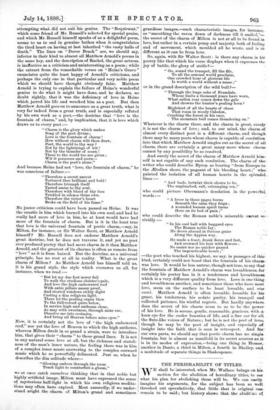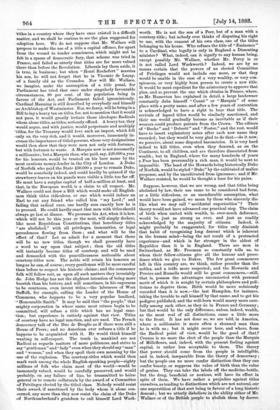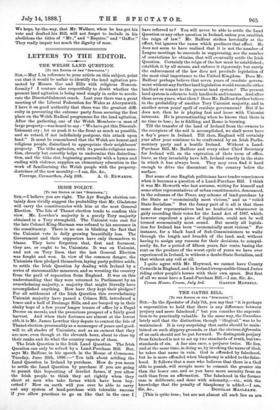THE PERISHABILITY OF TITLES.
WE shall be interested, when Mr. Wallace brings on his motion for the abolition of hereditary titles, to see what his plan for abolishing them will be. We can easily imagine his arguments, for the subject has been so well threshed out speculatively, that little that is original CAa remain to be said ; but history shows that the abolit:ou 'titles in a country where they have once existed is a difficult matter, and we shall be curious to see the plan suggested for -adoption here. We do not suppose that Mr. Wallace will propose to make the use of a title a capital offence, for apart from the wound to tender consciences, which might not be felt in a spasm of democratic fury, that scheme was tried in France, and failed so utterly that titles are far more valued -there than before the Revolution. Liberals lay them aside, it Is true, in business; but when "Henri Rochefort " marries his son, he will not forget that he is Vicomte de Lucay, -of a family old as the Crusades. Nor will Mr. Wallace, we imagine, make the assumption of a title penal, for Parliament has tried that once under singularly favourable -circumstances, 80 per cent. of the population being in favour of the Act, and Parliament failed ignominiously. 'Cardinal Manning is still described by everybody and himself -as Archbishop of Westminster. Nor, we fancy, will he bring in a Bill to lay a heavy tax on titles, for, not to mention that it would mot pass, it would greatly irritate those ideologue Radicals -whom alone titles, as titles, seriously offend. A heavy tax, they -would argue, and with justice, would perpetuate and multiply 'titles, for the Treasury would love such an impost, which fell -only on the very rich, and it would, moreover, immensely in- crease the importance of titled persons, whose very designations would then show that they were men not only with fortunes, but with fortunes to waste. A Marquis now is not necessarily a millionaire; but a Marquis then, who paid, say, 220,000 a year for his honours, would be trusted on his bare name by the -most cautious money-lender in the City of London. A Duke -of Norfolk who paid the State 230,000 a year to remain Duke, would be somebody indeed, and could hardly be quizzed if the strawberry-leaves on his panels were visible a little too far off. He must have a surplus capital of half-a-million at least, and -that, in the European world, is a claim to all respect. Mr. Wallace could not draw a Bill which would make all English- men think titles ridiculous, or one which would induce an Earl to cut any friend who called him "my Lord ;" and failing that radical cure, one hardly sees exactly how he is to proceed. He could hardly enact that men with titles should always go last at dinner. We presume his Act, when it is law, -which will not be this year or the next, will simply declare, like most Republican Constitutions, that hereditary titles "are abolished," with all privileges, immunities, or legal -precedences flowing from them ; and what will be the effect of that ? Let us admit for a moment that there will be no new titles, though we shall presently have a word to say upon that subject ; then the old titles will instantly become titles of courtesy, and will be used -and demanded with the punctiliousness noticeable about -courtesy-titles now. The noble will retain his honours as long as he can, of course; every gentleman will be more careful than before to respect his historic claims; and the commoner folk will follow suit, as upon all such matters they invariably do. John Hodge has not the slightest intention of being more boorish than his betters, and will sometimes, in his eagerness
-to be courteous, even invent titles,—the labourers of West 'Suffolk, for example, calling the Leader of the House of Commons, who happens to be a very popular landlord, -" Honourable Smith." It may be said that "the people," that mighty corporation in whose name most crimes begin to be committed, will refuse a title which has no legal sane- -tion ; but experience is entirely against that view. Titles -of coturtesy have no legal sanction, and are used. The French democracy talk of the Due de Broglie as if there were still a House of Peers ; and no American ever refuses a title if he happens to be acquainted with it. He would think himself wanting in self-respect. The truth is, mankind are not Radical as regards matters of mere politeness, and strive to say "gentleman" and " lady " even when they should say "man" and "woman," and when they spoil their own meaning by the ruse of the euphuism. The courtesy-titles which would then mark rank among the whole English-speaking people—eighty millions of folk who claim most of the world—would be immensely valued, would be carefully preserved, and would probably, on any failure of line, be transmitted to heirs- general or to remote collaterals by the award of a Committee -of Privileges elected by the titled class. Nobody would resist -their award, if sanctioned by the body whom it alone con- eerned, any more than they now resist the claim of the Duke of Northumberland's grandson to call himself Lord Wark-
worth. He is not the son of a Peer, but of a man with a courtesy-title; but nobody ever thinks of disputing his right to use, with the consent of his own class, one of the titles belonging to his house. Who refuses the title of " Eminence " to a Cardinal, who legally is only in England a Dissenting minister ? What, indeed, can it signify to any human being, except possibly Mr. Wallace, whether Mr. Percy is or is not called Lord Warkworth ? Indeed, we are by no means certain that the powers of an elected Committee of Privileges would not include one more, or that they would be unable in the case of a very wealthy, or very con- spicuous, or very highly born person to create a new title. It would be most expedient for the aristocracy to approve that plan, and BO prevent the one which obtains in France, where, as Mr. Hamerton has explained in detail, a large landowner constantly dubs himself " Count " or " Marquis " of some place with a pretty name, and after a few years of contention is acknowledged to have a right to bear that title. The revivals of lapsed titles would be similarly sanctioned, and their use would gradually become as inevitable as if their wearers could produce patents from the Crown. The editors of "Burke" and " Debrett" and "Foster," and the rest, would have to insert explanatory notes after each new name they recorded; but they would be very glad to do that,—do it now, we perceive, about some disputed baronetcies. It is very hard indeed to kill titles, even when they descend, as on the Continent, to all children, and are therefore dissociated from wealth ; but in England, where for many hundreds of years a Peer has been presumably a rich man it would be next to impossible. The head of the Howards being historically Duke of Norfolk, would be styled "Duke" by the cultivated of malice prepense, and by the uncultivated from ignorance; and if Mr. Wallace resisted, he would be thought a boor for his pains.
Suppose, however, that we are wrong, and that titles being abolished by law, their use came to be considered bad form, or a little ridiculous, or an unendurable assumption, what would have been gained, we mean by those who sincerely dis- like what we may call "accidental superiorities " P Their theory would not have advanced one practical step. The claim of birth when united with wealth, to over-much deference, would be just as strong as ever, and just as readily acknowledged by the majority of citizens. Indeed, it might probably be exaggerated, for titles only diminish that habit of recognising long descent which is inherent in the human mind—being the net result of a protracted experience—and which is far stronger in the oldest of Republics than it is in England. There are men in Switzerland, as Mr. Freeman so constantly tells us, to whom their fellow-citizens give all the honour and prece- dence which we give to Dukes. The few great commoners left in this country are, we think, rather prouder than the nobles, and a trifle more respected; and the Howard.s and Percies and Russells would still be great commoners,—still, that is, possess the advantages unconnected with personal merit of which it is sought by certain philosophers and poli- ticians to deprive them. Birth would be more sedulously recorded than it is now,—the last Hampden, for instance, taking the trouble to call himself by that name, and to get his pedigree published, and the well-born would marry more care- fully among each other, as they do in France and Germany; but that would be the only difference, unless, indeed, wealth, as the most real of all distinctions, came a little more to the front. It has not done so, we are told, in America, where a millionaire is more often a shunned man than he is with us ; but it might occur here, and where, from the Radical point of view, would be the good of that P Crcesus is no more the elect of the people than the Marquis of Millefleurs, and, indeed, with the present feeling against capital, is rather less acceptable to them. The theory that power should come from the people is intelligible, and is, indeed, inseparable from the theory of democracy ; but the people can no more confer distinction than they can confer beauty, or suppress the value of birth than the value of genius. They can take the labels off the medicine-bottle, but the drug, beneficial or noxious, will have its effect in spite of them. We have rather a prejudice against titles ourselves, as tending to distinctions which are not natural, our one superstition of that sort being in favour of a long historic descent ; but we utterly disbelieve in the ability either of Mr. Wallace or of the British people to abolish them by decree.
We hope, by-the-way, that Mr. Wallace, when he has got his vote and drafted his Bill, will not forget to include in his abolitions the titles of "Mr.," and "Esquire," and "Gaffer." 'They really impair too much the dignity of man.




































 Previous page
Previous page